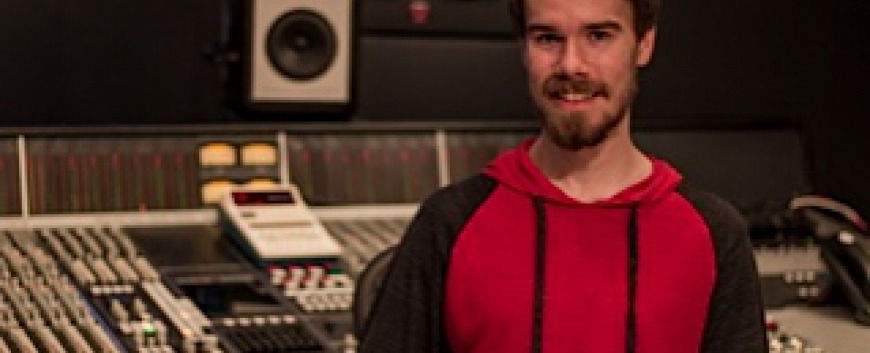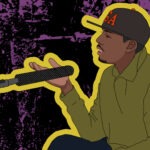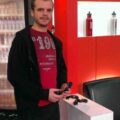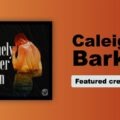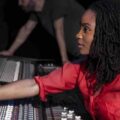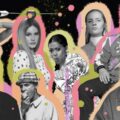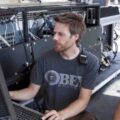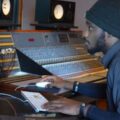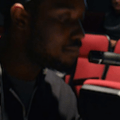RAC grad Luke Leveille has worked with artists Drake, Wiley, Ghostface Killah, P. Reign, The Weeknd, Gentlemen Husbands, Majid Jordan, and producers Noah “40” Shebib, Boy1da, Carlos Illangelo, Damon Sharpe, Pro Logic and Gavin Brown, to name a few. Luke discusses the path that led him to working with some world renowned artists and producers.
Luke, how did you get into music production?
I wanted to be in music since I was 15 years old. While in a band in my hometown of Timmins, Ontario, I paid a lot of money to record in someone’s studio. Unfortunately, I was disappointed with the finished product, so I took a step back and thought, I think could do this myself. I ended up buying an interface and a few microphones and began to record local bands in my parents’ basement, not really knowing what I was doing. When I finished high school I spoke to my guidance counselor, and he introduced me to RAC. The thing that I found appealing about Recording Arts Canada was that it was a one year program, and it was located in downtown Toronto.
What happened when you arrived in Toronto?
As soon as I got to Toronto I just thought this is perfect! Everything I need is right here. There’s a lot of excitement in the city. Lots of studios, promoters, big venues. Just tons of music. Growing up in a small town you get used to not having access to a lot of the music culture and resources needed to work in the industry, so I was overwhelmed with everything that was available to me here.
Describe your experience at RAC
RAC provided great practical experience for all the fundamentals. When I first arrived in Toronto, I had never sat behind a console before. I didn’t know anything regarding the theoretical and physical aspects of sound, I didn’t really know how a compressor or signal flow worked until I came to RAC and was taught properly. The key was having it all spelled out and getting a professional perspective on the fundamentals. RAC was where I was first trained on Pro Tools (the industry standard) and now I use nothing but Pro Tools as an audio engineer.
So, what happened next?
When I graduated from Recording Arts Canada, I made sure that my recording career was at the forefront of anything I pursued. I always made sure I was moving forward and making connections, and getting into a studio whenever the opportunity presented itself. Actually, a month before I graduated I got an internship at a small studio called Q Music. I spoke to one of our guest instructors, Robert Sibony, after his lecture, and I helped him tear down. After we had got talking, one thing led to another and he ended up offering me an internship. That’s where I met Dajaun Martineau and we began working together. We developed a great working relationship, eventually becoming roommates. We both ended up at Phase One, though he was hired as an assistant and I was there as an intern. About a week after I started interning at Phase One the studio manager, Donny Da Silva, left to Noble Street Studios. I stayed at Phase one for about a year and a half, and eventually left to try and work as an assistant elsewhere, since they were fully staffed for a while. That was when I applied at Noble Street, and through my brief encounter with Donny from Phase One, as well as a solid recommendation from the owner Barry Lubotta, was hired on at Noble.
Tell us about Noble Street Studios.
Noble Street Studios is a state of the art recording facility in a purpose built building at the heart of Toronto’s west end. It is designed to be an ideal environment for artistic expression and comfort, with the best in modern and vintage recording technology.
What projects have you worked on at Noble?
The biggest project was Drake. I worked closely as an assistant engineer with Noah “40” Shebib while he produced Aaliyah’s posthumous single “Enough Said” featuring Drake. From there, they began work on a lot of the tracks that would eventually become “Nothing Was The Same”, and any time they were at Noble Street, I was assisting on the sessions. Good things have come from having Drake on my resume. I’ve been fortunate enough to work with producers such as Carlos Illangelo, Gavin Brown, Eric Ratz, Ted Chung (who is Snoop Dog’s manager), as well as artists such as Wiley, The Weekend, and Waka Flocka Flame to name a few. All of sudden my hard work is paying off and I’m getting in the same room as these talented producers and artists.
What advice would you give to prospective students?
First and foremost, figure out if music is really what you want to do. There’s no sitting on the fence with a music industry career. Music has to be front and centre in every decision you make. When you commit to it, you’ve got to keep doing it. There is no clear path. Everyone will have a different journey, so keeping at it is the most important thing. I did anything that would keep me in a studio, and I made sure my priority was audio. Any time I wasn’t working to make money, I was working to make music, and that was how they eventually became the same thing.
How did FACTOR play an important role in the development of your career?
I’ve submitted about 10 FACTOR grants so far in my career, and received funding for 6 of those projects. This is where the RAC program was great. The Music Industry course at RAC brought in guest lecturers that had gone through the FACTOR system before, and that helped me a lot. It gave me a very clear perspective on what FACTOR was looking for. Most bands don’t have a clue how FACTOR works, so that knowledge helped me dissect a band’s application, and to look at it as a FACTOR juror would.. My advice is to think of it as though you’re giving the application to an investor. A lot of bands think of it as a hand out, but you need to be strategic, and a little business savvy, in order to submit an application that will meet the necessary criteria. In the end, I’ve used FACTOR to finance projects that were really important for my career, so it’s been a pivotal part of my growth as an engineer and producer.
Tell us about your on-the-job training?
When I first arrived at Noble, they had just purchased a vintage SSL 6000 console for studio B, which used to be in McClear Digital’s studio C. At the same time, they were putting the new booth into studio B, so I was lucky enough to be part of all the wiring and rebuilding involved with both of those projects. I was part of all the recapping, soldering, and re-assembly of the console, and that taught me so much about vintage consoles and recording technology. I also work very closely with our technical engineer, Chris Simon, maintaining and repairing our equipment, so I get to learn a lot about what is happening under the hood with our gear. It is very satisfying, especially since a lot of components aren’t made any more. We have to do tons of research and troubleshooting to get it right. I was also part of a huge project last spring where we refitted both our vintage SSL consoles with new bus routing switches. The switch assemblies aren’t made anymore, so we had to design and build them from scratch. We had to create assembly lines where one guy is de-pinning the old cards, another person is putting switches on the new cards, another is re-pinning the assemblies, and another is putting them in the console strip. That was a solid three months of work, and it felt great to see the work completed. I have also built custom pre amps on my own, where I assembled all the components and would troubleshoot any problems with my gear.
What would you tell a prospective intern?
Show up with a good attitude, get along with everyone, be intuitive, and always keep the studio well maintained and clean. Keep your head down, if they tell you your internship is 10am till 6pm, never hesitate to go above and beyond. Be prepared to commit as much time as you can and then some, just because you want to make yourself present for any opportunities. If it was something you’d be doing anyway, why feel the need to rush away when the clock reaches a certain time? If you do the bare minimum of what is asked of you, then they’ll simply say thank you for your time and send you on your way.
Tell us, what’s next for you?
I’ve started to get into video production a little bit. There are a lot of aspects to it that relate back to music, so it’s a fun hobby.
Recording Arts Canada would like to congratulate Luke on his accomplishments. Clearly, this is just the tip of the iceberg of a great career that is unfolding as we speak. Here is Luke Leveillie’s credit list;
Artists
Drake Wiley Ghostface Killah P. Reign The Weeknd Gentlemen Husbands Majid Jordan
Producers
Noah “40” Shebib Boy1da Carlos Illangelo Pro Logic Damon Sharpe Gavin Brown Eric Ratz
